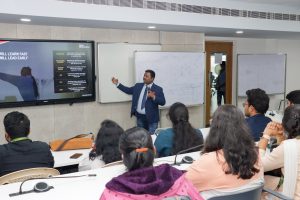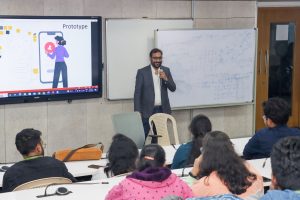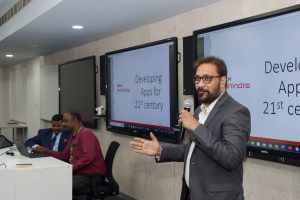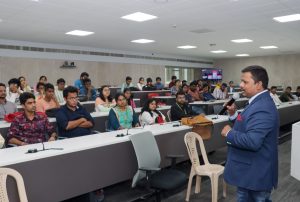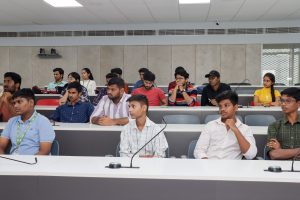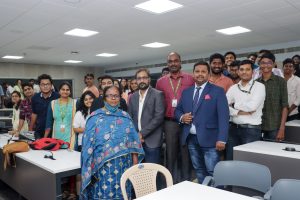Launch your career with MBA (General/BFS/Data Science)
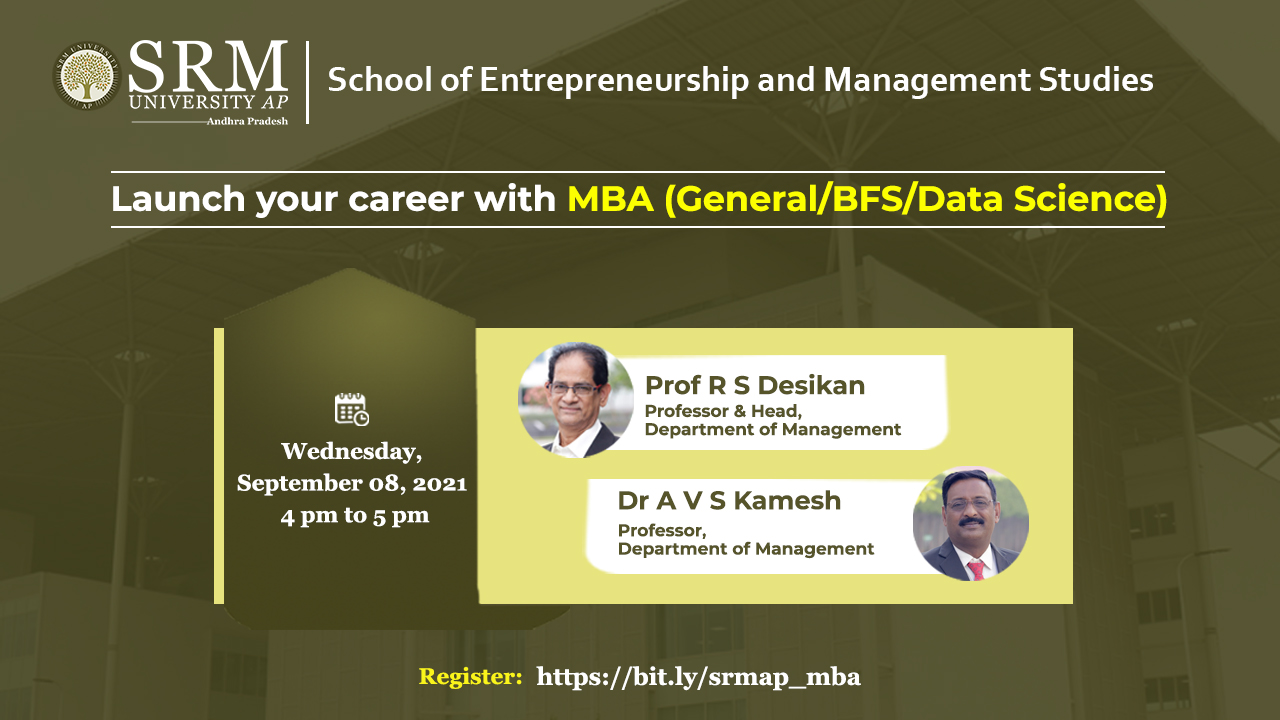 School of Entrepreneurship and Management Studies, SRM University-AP is organising an interactive session by the faculty with prospective students of the MBA program. Prof R S Desikan and Dr A V S Kamesh will elaborate on the latest trends in management education on September 08, 2021, at 04.00 pm.
School of Entrepreneurship and Management Studies, SRM University-AP is organising an interactive session by the faculty with prospective students of the MBA program. Prof R S Desikan and Dr A V S Kamesh will elaborate on the latest trends in management education on September 08, 2021, at 04.00 pm.
The Department of Management has a team of outstanding faculty with extensive experience in their respective fields of expertise. General MBA, MBA (Data Science) Business Analytics, and MBA in Banking and Financial Services courses provide outcome-based education with contemporary curricula designed by reputed academicians and industry experts. The department aims to nurture entrepreneurs and game-changers who create a competitive advantage for new-age businesses and governance. Graduates from the department are placed in top companies throughout India.
The speakers will enlighten the audience in detail about the MBA Programs offered by the university and focus on potential career opportunities for the graduates who study the MBA (General/BFS/Data Science) specialisations at SRM University-AP.
Join this engaging webinar on September 08, 2021, at 04.00 pm to know how MBA at SRM University-AP can shape your career in the ever-changing business environment.
Register here: https://srmap.zoom.us/webinar/register/WN__UbYvSyvRKexu3pP36HHYA
- Published in Admissions, Blog, Departmental Events, Events, Paari Current Happenings
Dr Sumit Kumar publishes two research articles in reputed journals
 Dr Sumit Kumar, Assistant Professor from the Department of Management has recently published two papers in highly reputed Scopus indexed journals. The paper titled “Managing employees’ turnover: findings from AHP model” is published in the International Journal of Economics & Business Research and “Economic Prosperity and Environmental Sustainability: Role of Infrastructure Development” in the Indian Journal of Ecology.
Dr Sumit Kumar, Assistant Professor from the Department of Management has recently published two papers in highly reputed Scopus indexed journals. The paper titled “Managing employees’ turnover: findings from AHP model” is published in the International Journal of Economics & Business Research and “Economic Prosperity and Environmental Sustainability: Role of Infrastructure Development” in the Indian Journal of Ecology.
Managing employees’ turnover: findings from AHP model is an attempt to compare and evaluate the relative significance of myriad HR issues leading to better management of the employee turnover problem. The research questions explored and examined in this study provided deeper insights and a better understanding of the problem of retaining and nurturing human capital and have relevant implications for scholars, policymakers, and retail organisations. An important theoretical contribution of the study is in enriching the literature on employee retention in the organised retail sector. The practical implications of this study mainly emanate from the results of this study and are related to practices of managing people at work. The findings of the study can be effectively used to design a robust retention policy.
Read the full paper here
The second paper titled Economic Prosperity and Environmental Sustainability: Role of Infrastructure Development is co-authored by A. Mishra, M. Sharma, and et. al. This pragmatic investigation strives to divulge the relationship between infrastructure expansion and environmental defilement in the Indian outlook by realistically exerting panel data of 10 Indian states, which contributes 70 per cent of the total national population. The precise outcome of the investigation demonstrates that some proxies of infrastructure improvement such as electric capacity, railways network, road network and telecommunication have linkage with the air quality index in India.
Dr Sumit Kumar is an Assistant Professor in the School of Entrepreneurship and Management Studies, SRM University AP, Andhra Pradesh, India. He has done his PhD from the Indian Institute of Technology (Indian School of Mines), Dhanbad in Marketing Management. He has eight years of rich experience in the industry, research, and academia. His research, interests focus on the areas of marketing and consumer behaviour, green products, private label brands (PLB), virtual retail environment and online retail. He has also presented papers at premier national and international conferences. He authored and co-authored several research articles in reputed international and national journals.
- Published in Faculty, News, Paari Current Happenings, Research News
Best paper presentation award in the PRISM conference
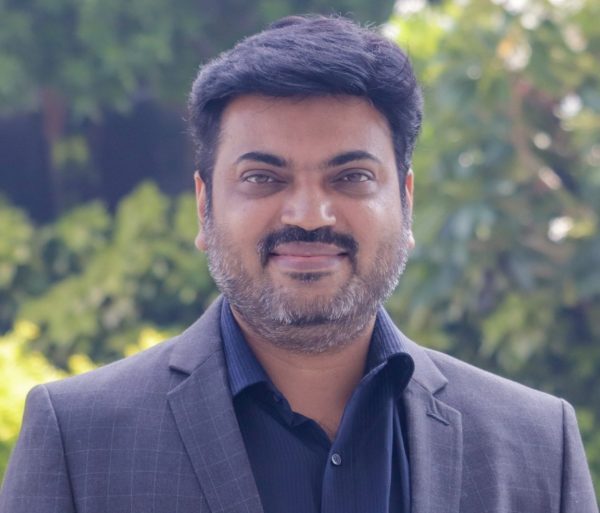 Research at SRM University-AP is always geared to top the solutions that we have to our current problems. One of the most enduring issues in the field of management is crisis management. The PRISM conference has found one of our faculty member’s solution to be most beneficial and awarded him with the Best Paper Presentation Award. Dr Vimal Babu, Associate Professor-SEAMS, has come up with a response that will not only help leaders manage crisis situations with increasing efficiency but also make it possible for them to thrive in the face of adversities.
Research at SRM University-AP is always geared to top the solutions that we have to our current problems. One of the most enduring issues in the field of management is crisis management. The PRISM conference has found one of our faculty member’s solution to be most beneficial and awarded him with the Best Paper Presentation Award. Dr Vimal Babu, Associate Professor-SEAMS, has come up with a response that will not only help leaders manage crisis situations with increasing efficiency but also make it possible for them to thrive in the face of adversities.
About the paper:
The purpose of the present research is to understand how global pandemic forces shaped the leadership communication strategies of the managers working in the Information Technology (IT) industry in India, in turn, how their leadership communication strategies aided in achieving agile and authentic leadership communication in relation to their own employees. It studied the leadership communication strategies of managers which facilitated them to establish emotional connect with the employees working remotely during pandemic crisis.
Abstract:
An investigation of the major themes in leadership communication strategies during times of crisis is presented in this research. It applies thematic analysis (TA) as a qualitative method to investigate effective leadership communication strategies in crises to overcome employee-centric organisational issues. Major themes and sub-themes are linked together to grasp better understanding about qualitative data. As a result, a total of five major themes emerged. Findings reveal that HR managers must consider the impact on their employees’ well-being when making verbal communication and crafting messages for their teams during times of crisis. The research developed a conceptual framework for mapping out the major themes, viz. information consumption and news making; disinformation and narrative disruption; agile communication structures; striking the balance b/w humane and factual communication and leadership communication imperatives. The themes generated substantive theory featuring agile and authentic leadership communication for the managers. As organisational leaders, managers’ challenges and communication strategies during a crisis are discussed. Future research ideas are highlighted.
Social Implications:
As a result of this research, it is now possible to deal with crisis communication challenges of managers more effectively. To avoid reacting to disinformation, one must be able to recognise it when it appears in abundance in a short period of time and recognise it when it does not. Managers of the HR department are held in high regard by their employees, who look to them for guidance and support. An agile communication structure, such as clearly stated goals, lean approvals and clarity of purpose will have a big impact upon the designing of communication strategies initiated by organisational leaders, especially when the attempts are made to interact with the employees remotely. That being said, managers need to strike a balance between human and factual communication in order to develop trust, transparency, and cooperation with their employees.
Collaborators:
The present work has been successfully carried out with the contributions of the co-researchers of the research paper, viz. Dr. Anugamini Priya Srivastava, Symbiosis International University, Pune and Mr. Vipin Kumar, Project Management Professional, BT India.
Future:
The future research plans entail working in the area of employee sustainability, well-being and career development of the workforce along with crisis management.
- Published in Departmental News, News, Paari Current Happenings
Eminent Lecture Series with Prof Haribabu Ejnavarzala
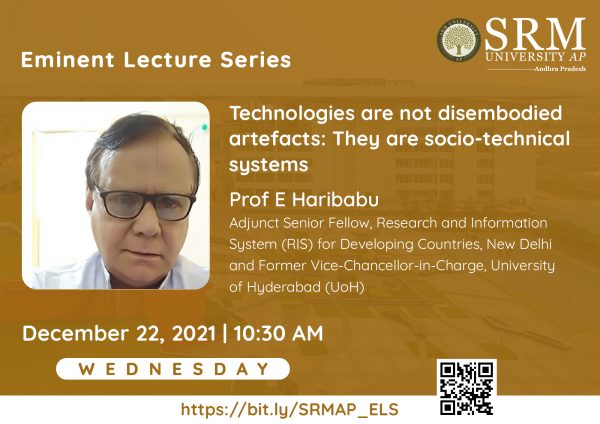 Technology is deeply integrated into the human society. The Department of Management Studies invites you all to the Eminent Lecture Series with our guest Prof Haribabu Ejnavarzala, for an engaging session on the economic, social, and other impacts of new technology on our lives.
Technology is deeply integrated into the human society. The Department of Management Studies invites you all to the Eminent Lecture Series with our guest Prof Haribabu Ejnavarzala, for an engaging session on the economic, social, and other impacts of new technology on our lives.
Topic: Technologies are not disembodied artefacts: They are socio-technical systems
Date: December 22, 2021
Time: 10.30 am IST
About the Speaker:
Prof Haribabu Ejnavarzala is an Adjunct Senior Fellow, Research, and Information System (RIS) for Developing Countries, New Delhi and Former Vice-Chancellor-in-Charge, University of Hyderabad (UoH).
Abstract:
Technologies are socio-technical systems. The forces that shape the development of technology are social, economic, cultural, political, and ethical in nature. A technology introduced into society has consequences for interrelated domains -social (class, caste, gender relations), economic, political, cultural, and ethical. Technologies also affect the environment- water, soil, air, and non-human forms of life. In other words, technologies are embedded in societal and environmental contexts. In order to understand the values and interests underlying the construction of technological innovation and its consequences, we have to unpack the design of a given technology and its associated practices. Technologies are intricately related to the interests and meaning structures of stakeholders. In this lecture, I focus on genetic modification of crops to show that it is a socio-technical system deeply connected with interests, sometimes conflicting interests, and meanings of relevant stakeholders – farmers who use the technology, consumers of products produced by genetic modification of crops, government, regulatory agencies, judiciary, and civil society organisations in the Indian context. In conclusion, I argue that innovations that promote equity, inclusivity and justice will have more significant social acceptability.
Please join this spirited session with our eminent guest on December 22, 2021, at 10.30 am IST for the next edition of Eminent Lecture Series.
- Published in Departmental Events, Events, Paari Current Happenings
Startup incubated by BBA student crosses ₹1 crore turnover
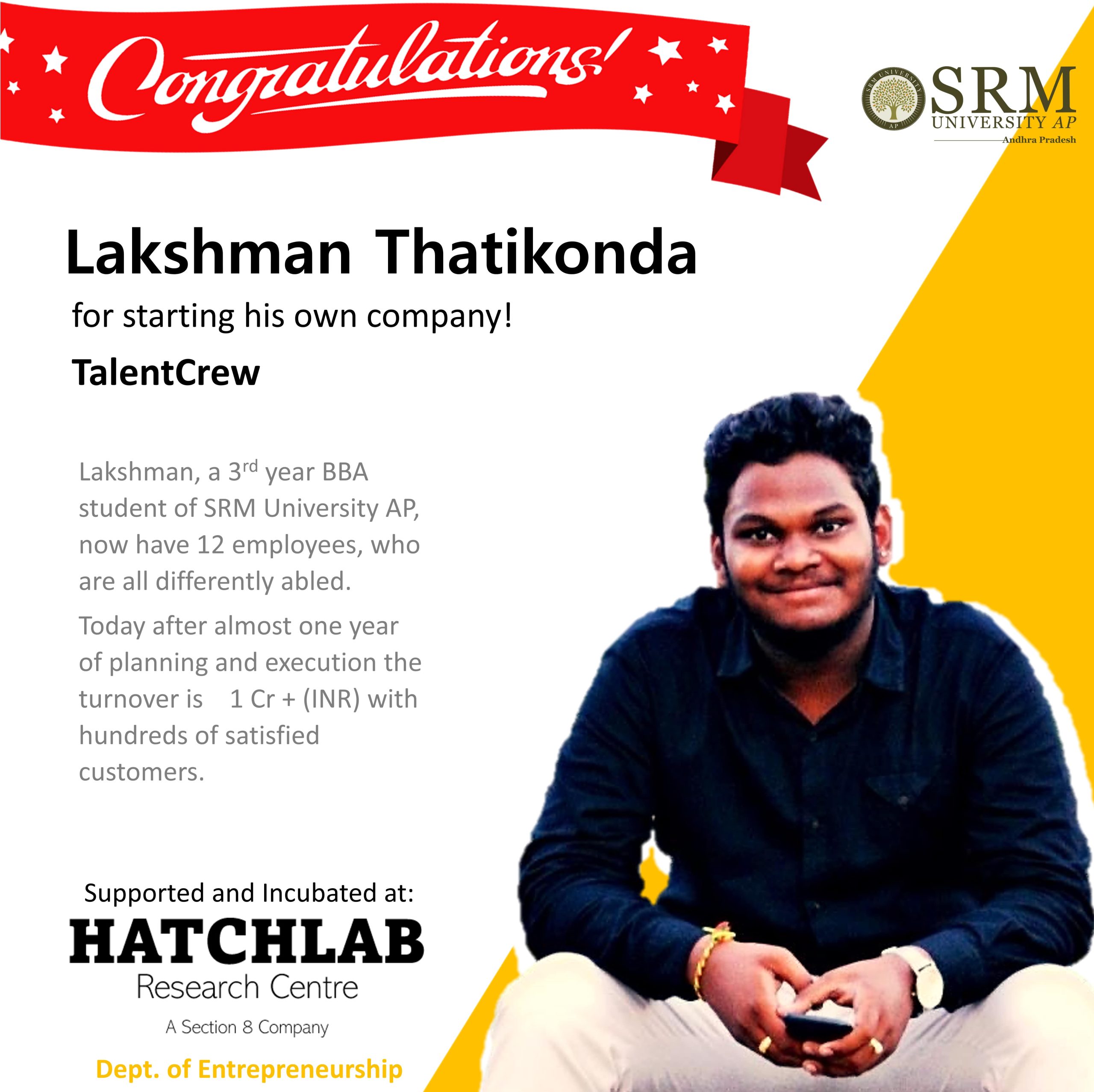 Mr Lakshman Thatikonda, a 3rd year BBA student of SRM University-AP, has started his own business venture (TalentCrew), incubated at the Hatchlab Research Centre– The technology and livelihood business incubator of SRM University-AP.
Mr Lakshman Thatikonda, a 3rd year BBA student of SRM University-AP, has started his own business venture (TalentCrew), incubated at the Hatchlab Research Centre– The technology and livelihood business incubator of SRM University-AP.
The talent crew is a skill-based startup. They are one of India’s largest multi-category customised gifting companies, providing one of the best-curated collections of festival merchandise, gifts, handicrafts, wedding cards, carvings & personalised products for all occasions & festivals. TalentCrew has a global footprint with customers spanning 20 plus countries and the capability to deliver gifts to over 50 countries and 300 plus cities in India. Mr Lakshman started this organisation on the principles of creativity, agility, and social responsibility.
Over the next few years, TalentCrew envisions exploring and developing new products and services that will actively expand business while touching social responsibility.
Experience at Hatchlab Research Centre
The Hatchlab research centre aims to support SRM E-Cell’s mission of developing entrepreneurial talent and fostering the commercialisation of new ideas ventures. “Working with Hatchlab research centre was always a great experience. Here I found the fresh start for the innovation, and here the programme is very well structured with the right blend of practice,” says Mr Lakshman. “The best thing about this programme is that it allows me to learn while still being employed. And I always feel thankful for Dr Lakshmana Rao sir, for motivating me on every stand that I take, and Udayan Bakshi sir, for giving me such a wonderful opportunity” he added.
- Published in Blog, IDEA NEWS, Innovation, News, Paari Current Happenings, Students Achievements
French Delegation in SRM University-AP discusses prospects of academic collaboration
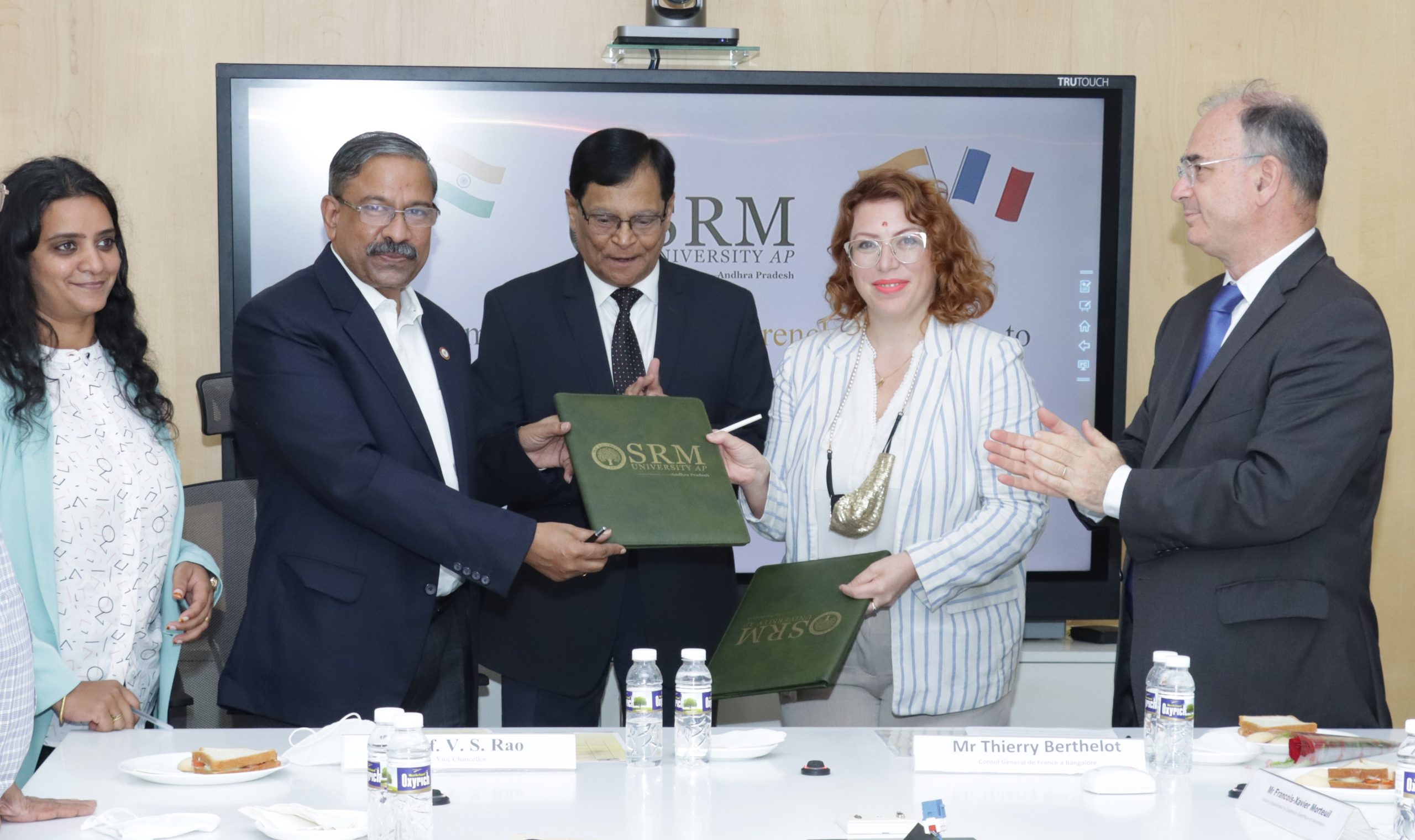 MoU inked with Rennes School of Business
MoU inked with Rennes School of Business
As part of an official visit to Andhra Pradesh, members of the French Delegation visited the SRM University-AP campus on Friday, 25 February 2022. An MoU has been signed between Rennes School of Business, France and SRM University-AP on student exchange, curriculum development, and articulation programmes. University Vice-Chancellor Prof V S Rao called the MoU “an important milestone for SRM AP” and welcomed students from France to India.
Mr Thierry Berthelot, Consul General de France a Bangalore, reaffirmed the MoU between India and France in the number and quality of student exchanges. “We have reached the aim of 10,000 Indian students by 2020; now, we look forward to increasing the number of Indian students in France significantly to 20,000 by 2025”, he added. The signing of the agreement for the mutual recognition of degrees will facilitate the pursuit of higher education by Indian students in France and French students in India and enhance their employability. The delegation emphasised that the collaboration with Rennes School of Business will further equip students of SRM University-AP to gain professional experience and job opportunities around the world. Mrs Maud LE BARS, South Asia Area Manager Rennes School of Business and Conseillere du Commerce Exterieur de la France, highlighted the student and faculty diversity in France that surpasses language barriers.
Consequently, Dr Naga Swetha Pasupuleti, Associate Director – International Relations and Higher Studies, talked about the strong partnerships SRM AP holds with QS ranked global universities and especially EFREI, France. The delegation interacted with the students and faculty members of SRM University-AP and discussed various possibilities of international internships and study abroad opportunities.
Mr Francois-Xavier Morteuil, Attache Consulaire pour la Coopération Scientifique et Universitaire; Mrs Ambika Anilkumar, Deputy to Attache Consulaire; Mrs Vasudha Murlikrishna, Campus France Manager Hyderabad; Mrs Vidya Suresh, Country Manager ESIGELEC (engineering school in France); and Mr Samuel Berthet, Director of Alliance Francaise of Hyderabad were part of the delegation and explored the university campus.
Pro-Vice-Chancellor Prof D Narayana Rao, Registrar Dr R Premkumar, Deans and Associate Deans of all schools were present in the discussion pertaining to the future scope of collaborations with French academic institutions.
- Published in Departmental News, International Relations, IR-News, News, Paari Current Happenings
Evaluating workplace well-being
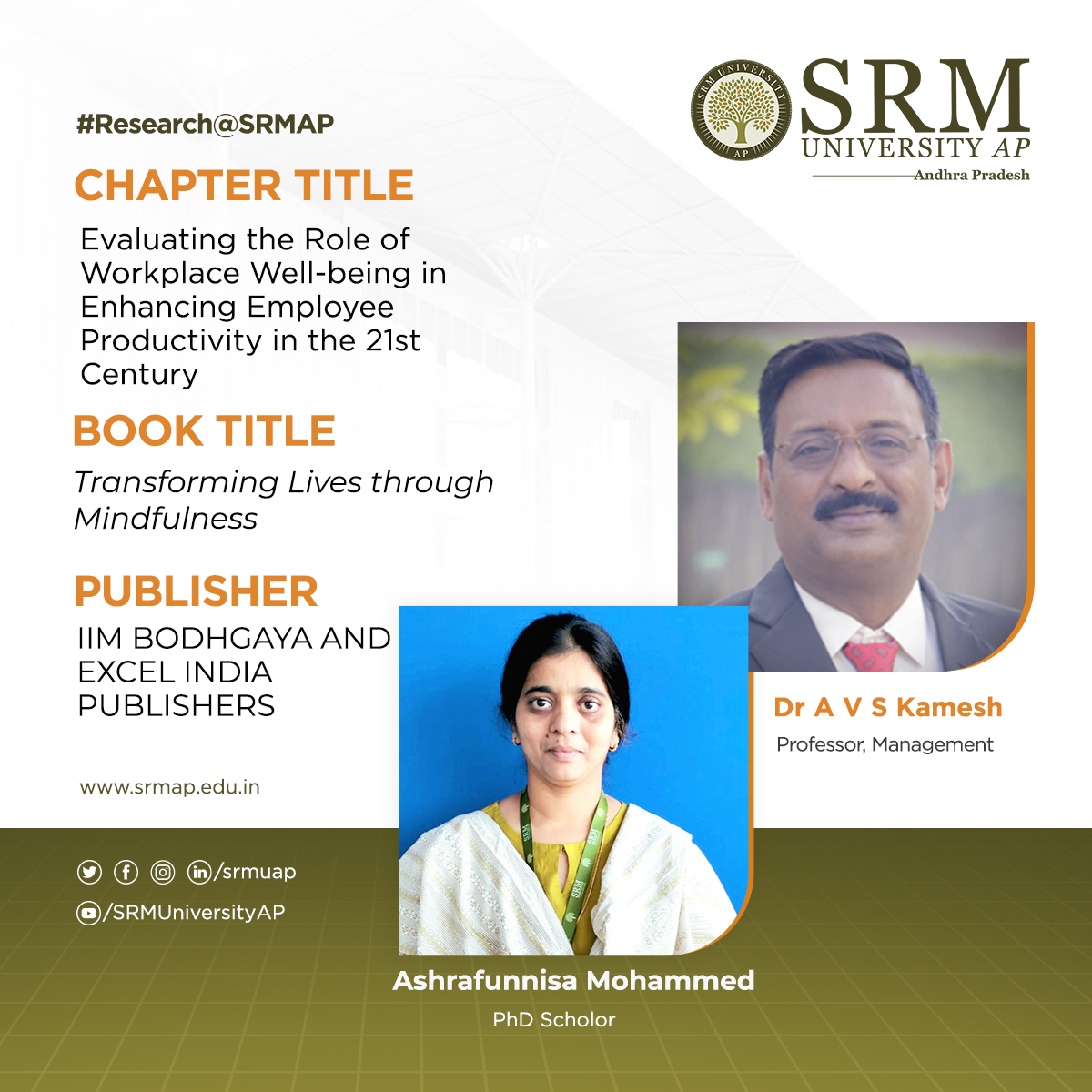
Employee wellbeing and productivity of the organisation are closely interlinked concepts mutually impacting each other in the long run. The idea of workspace wellness and health promotion has been making rounds in recent times, and the outset of the coronavirus pandemic has given added importance to the topic. Having conducted intense study in this regard, Prof AVS Kamesh and his PhD scholar Ms Ashrafunnisa Mohammed from the Department of Management have authored a chapter titled ‘’Evaluating the Role of Workplace Well-Being in Enhancing Employee Productivity in the 21st Century’’, in book Transforming Lives through Mindfulness published by IIM Bodh Gaya AND Excel India Publishers.
Their study tries to evaluate the unique role of workplace well-being in enhancing employee productivity in the 21st century. The contemporary business world is characterised by organisations competing against each other. In a dynamic and complex business environment, the main aim of modern corporate organisations is to retain talented employees by ensuring mindfulness and workplace well-being because these employees are the main sources of competitive advantage from a strategic point of view. Thus, an enhanced level of workplace wellbeing is an effort to create happy and productive workers so that they work optimally and happily. Work is a key social determinant of population health and well-being.
Workplace well-being in India is often focused on changing individual health behaviours through employer wellness programs. The Covid-19 health crisis brought into focus, some of the limitations of present approaches revealing structural conditions that intensify the physical and psychosocial problems of employees and their family members. The onset of the Covid-19 pandemic augured the new dimension of workplace well-being by converting home into a happy place to work. This perspective leads management experts and human resource managers to think about a combined model of work and home as a place of well-being.
This chapter is significant in the times of Post Covid-19 with new perspectives evolving to discuss work-life balance and well-being at workplace which are significantly related to the productivity of the employees. The article mainly targets management educators, corporate managers and personnel managers from public sector companies in India, calling for a comprehensive renovation in the workplace environment.
- Published in Departmental News, News, Paari Current Happenings, Research News
Comparing organic food preferences of American and Indian consumers
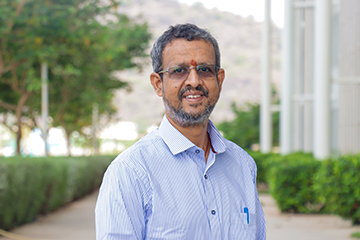
A paper titled “Organic food preferences: A comparison of American and Indian consumers” has been published by Prof Bharadhwaj Sivakumaran, Dean- SEAMS, SRM University-AP, Kirubaharan Boobalan (SSN College of Engineering), and Margaret Susairaj (Great Lakes Institute of Management, Chennai) in the journal Food Quality and Preference having an Impact Factor of 5.6.
This research tests a nomological model predicting organic food attitudes and purchase intentions in USA and India. Data were collected from India (n = 687) and the USA (n = 632) using Amazon M Turk and were analyzed using structural equation modelling and multi-group moderation technique. Results revealed that over and above attitude, subjective norm and perceived behavioural control, response efficacy and self-expressive benefits significantly affect consumers’ attitudes and purchase intentions toward organic food among American and Indian consumers. Findings reveal that response efficacy and attitude matter more in the USA while subjective norms and self-expressive benefits exert a greater influence in India. Therefore, marketers may reinforce belief-related elements while selling organic food products in the USA and societal-related elements while selling in India. Theoretically, this work adds to the Theory of Planned Behavior by adding self-expressive benefits and develops a common model for organic food across samples in USA and India.
- Published in Dean, Departmental News, News, Paari Current Happenings, Research News
Successful Food-Tech Venture hoists Jaswanth to Newer Heights!
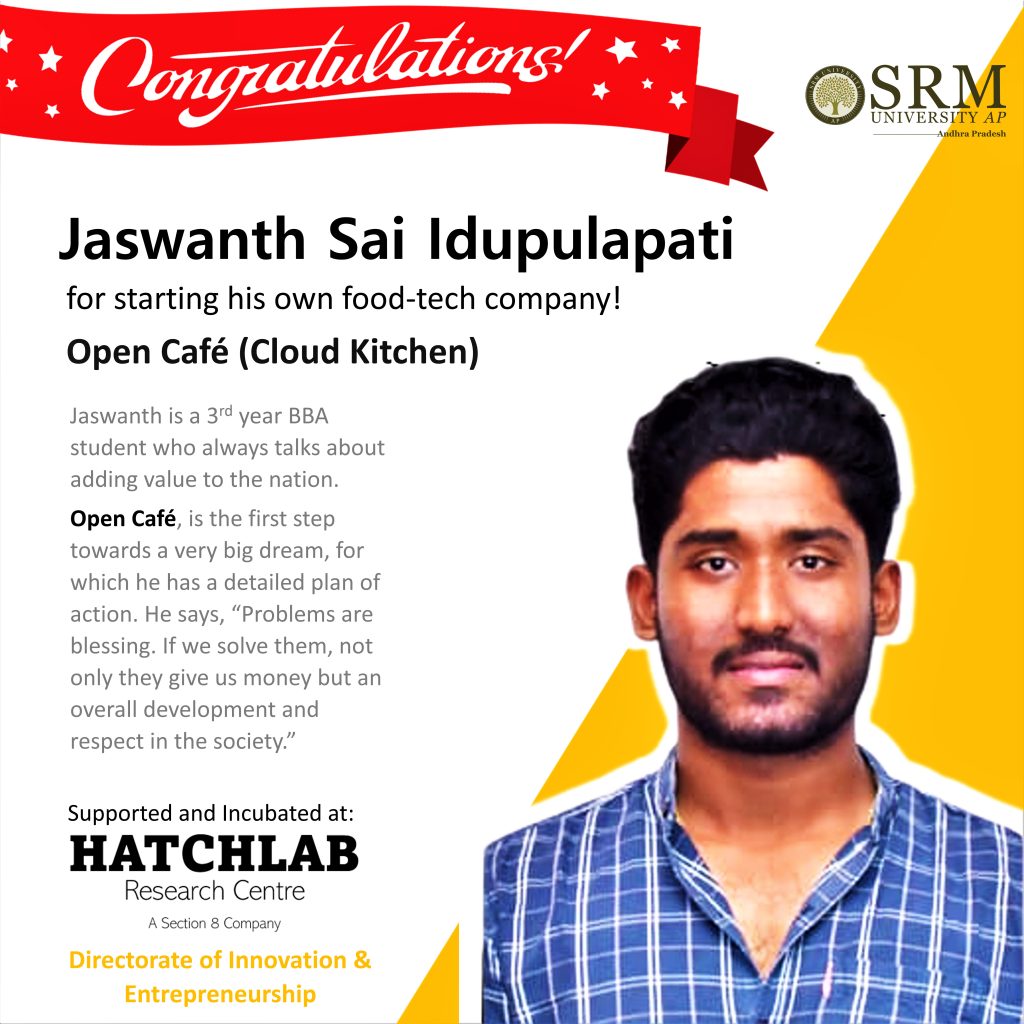
“The best way to predict the future is to create it”. Jaswanth Sai has proved to be a living and breathing manifestation of this quote with his determination and hard work. The Directorate of Entrepreneurship and Innovation is pleased to announce that Jaswanth Sai Idupulapati, a 3rd year BBA student, has successfully started his own food-tech company, Open Cafe, a cloud kitchen enterprise. Cloud kitchens are centralised, licensed commercial food production facilities where one to dozens of restaurants rent space to prepare delivery-optimised menu items. Jaswanth, an enthusiastic student of the Hatchlab Research Centre had started his business with an investment of Rs. 5000/- and today his turnover is more than 20L per month for a business that was started just three months ago!
“We invested Rs. 5000 and brought a van full of biriyani outside the main gate of our university. Hours passed and not a single sale happened. Those moments were not only depressing but also terribly demotivating. But as a leader, I had to rise up! We immediately changed the pricing strategy and shared the same via WhatsApp groups. In the next 45 minutes, we were left with empty vessels and a handful of cash. Profit was less; the learning and our confidence levels were mountain high,” Jaswanth excitedly mentioned about his first day of business.
As of now, Open Cafe caters to more than 1000+ students from SRM AP and VITAP, with quality food items that are delivered with a caption – 15 minutes delivery. Jaswanth has 15 employees and a big renovated kitchen, generating employment and thousands of satisfied customers.
His dedication and hardcore willpower allowed the materialisation of his idea into reality. Congratulations to Jaswanth Sai for his astonishing achievement!
- Published in Departmental News, IDEA NEWS, News, Paari Current Happenings, Students Achievements
A Business Rendezvous with Tech Mahindra
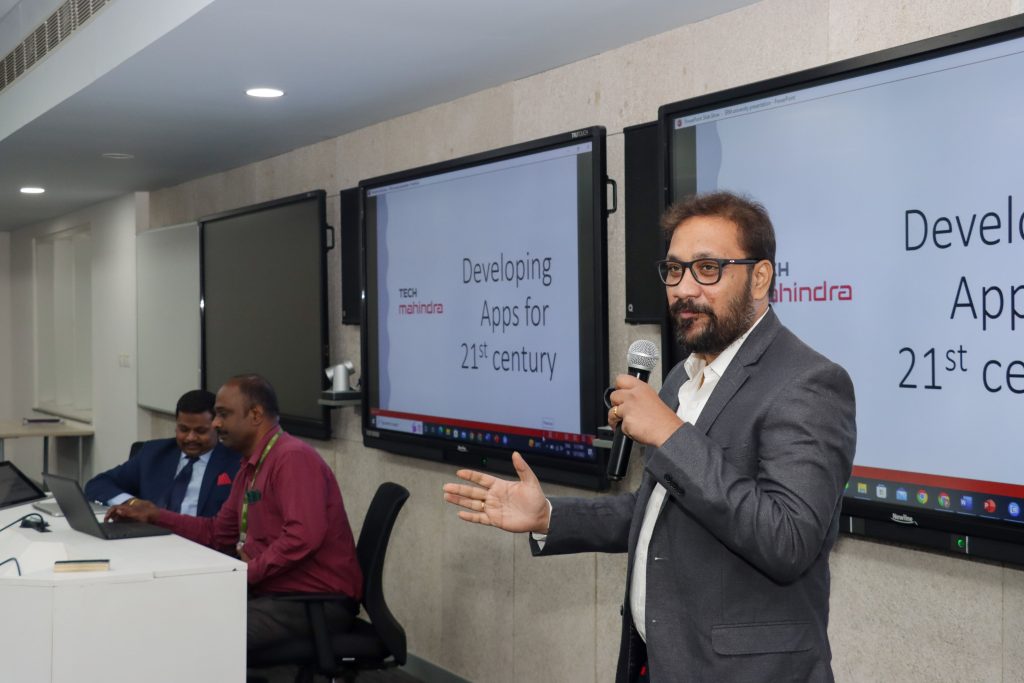
Paari School of Business upholds the importance of connecting business knowledge with hands-on market experience to develop competent candidates with refined managerial skills, ready to tackle the challenges of the business world. Their consistent approach to conducting industrial talks and research invites business giants from across the world to engage in insightful discourse with the students of management. The recent industry talk organised by the school invited a team from Tech Mahindra, the multinational information technology services and consulting company to provide exposure to practical compatibility of their knowledge to the requirements demanded by profession. The talk featured executives from the renowned enterprise addressing students on relevant trends and recent strategies in the market.
Mr Srinivas Reddy, Sr. Recruitment Manager and Vijayawada Location Leader, BFSI & Healthcare and Life Science’s Pan India Recruitment Leader held an engaging talk on the topic, “People Management Influence on IT Industry Business”. Mr Reddy highlighted how to connect with industry professionals and the influence of business networks in the IT business. He also discussed the importance of connecting business knowledge with the technical domain. Mr Kalyan Yelisetty, Manager – Product Development and Testing operations, also addressed the students in the evolving trends in the field of product development and testing in his lecture on “Developing products for the 21st century”. The Industry talk also threw light upon placement opportunities for business students.
The Industry talks and lectures aim at assisting students in aligning themselves with the latest requirements of the industry and sharpening their business acumen with expert discourses on pertinent topics related to the field. The Paari School of Business manifests this vision and upholds the need for bridging the gap between business management and technological advancements.
- Published in Departmental News, News, Paari Current Happenings


